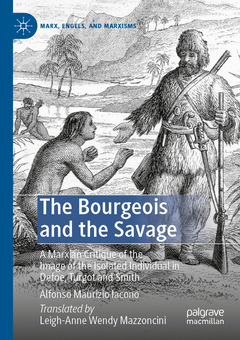Description
The Bourgeois and the Savage, 1st ed. 2020
A Marxian Critique of the Image of the Isolated Individual in Defoe, Turgot and Smith
Marx, Engels, and Marxisms Series
Author: Iacono Alfonso Maurizio
Language: English
Subjects for The Bourgeois and the Savage:
Approximative price 79.11 €
In Print (Delivery period: 15 days).
Add to cartPublication date: 03-2021
Support: Print on demand
Approximative price 79.11 €
In Print (Delivery period: 15 days).
Add to cartPublication date: 03-2020
147 p. · 14.8x21 cm · Hardback
Description
/li>Contents
/li>Biography
/li>Comment
/li>
This classic text in Italian history of political philosophy, translated into English for the first time, investigates the philosophical and ideological conceptions hidden beneath the modern image of the isolated individual. In The Bourgeois and the Savage, Alfonso Maurizio Iacono reveals that this apparently simple and transparent image is imbued with a profound complexity containing human and social relationships, which are intertwined with relationships of power, domination, inequality, colonisation and servitude. As Karl Marx argued, and as was later confirmed by twentieth-century anthropology, the isolated individual does not stand at the beginning of history; he can emerge only where social relationships are already very developed and where society appears as a tool used for private purposes. Considering the writings of Daniel Defoe, the great French Enlightenment philosopher Turgot, and the father of political economy Adam Smith, The Bourgeois and the Savage critically analyses the process which led to the naturalisation of the image of the isolated man and traces its development and transformation into a still dominant paradigm.
Alfonso Maurizio Iacono is Professor of History of Philosophy at the University of Pisa, Italy. He is the author of numerous books including Le Fétichisme: Histoire d’un Concept (1992), Autonomia, Potere, Minorità (2000), Caminhos de Saida do Estado de Menoridade (2001), The History and Theory of Fetishism (2016), and Studi su Karl Marx (2018).
Provides the first English translation of the classic Italian work Il borghese e il selvaggio first published in 1982
Analyses Defoe, Turgot and Smith from a Marxian perspective
Considers the paradigm of the isolated man as a means of hiding the colonial and slavish presuppositions underlying the birth of middle-class ideology

